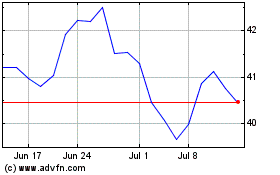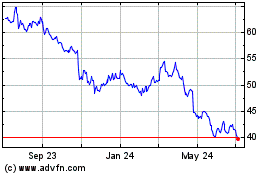Bristol's Opdivo Shows Benefits in Cancer Immunotherapy Trial
April 17 2016 - 8:50PM
Dow Jones News
More than one-third of advanced melanoma patients treated in a
study of Bristol-Myers Squibb Co.'s Opdivo have survived at least
five years, researchers said, providing fresh evidence of the
durable benefit cancer immunotherapy agents have for some
patients.
The study followed 107 patients who were enrolled in an early
trial of the drug, which was approved for melanoma by the U.S. Food
and Drug Administration in 2014. Thirty-four percent of the
participants, all of whom had failed on other drugs, were still
alive five years after treatment.
"This is a new benchmark for melanoma," said F. Stephen Hodi,
director of the Melanoma Center at Dana-Farber Cancer Institute,
Boston, and an investigator at Harvard Medical School's Ludwig
Center.
Dr. Hodi presented the findings at the annual meeting of the
American Association for Cancer Research in New Orleans. The AACR
said a National Cancer Institute database shows that the five-year
survival rate for patients diagnosed with advanced melanoma between
2005 and 2011 was 16.6%.
Opdivo is one of three so-called checkpoint inhibitors currently
on the market. Blocking the checkpoints releases molecular brakes,
thus allowing immune system cells called T cells to attack cancer.
Opdivo, and a rival called Keytruda from Merck & Co. target a
brake called PD-1. (Both are approved for melanoma and for lung
cancer.)
The first checkpoint inhibitor to reach the market was Yervoy,
also from Bristol-Myers. It targets a brake known as CTLA-4 and in
a previous analysis was shown to result in long-term survival in
about 22% of melanoma patients.
The Yervoy results, and now the new findings for Opdivo, are
especially significant, oncologists said, because they suggest, in
each case, patients who survive a certain length of time—three
years for Yervoy and about four years for Opdivo—are highly
unlikely to relapse. That is essentially an unheard-of result in
advanced cancer. The treatments appear to have enabled their immune
systems to eradicate or take control of their tumors.
"People who have good responses really seem to be protected
against their disease returning in many cases," said Louis M.
Weiner, director of the Georgetown Lombardi Comprehensive Cancer
Center, Washington, D.C., who wasn't involved in the studies. "This
is a mark of distinction in immunotherapy."
Still, two-thirds of melanoma patients aren't as lucky. But the
success that has been achieved has sparked a wave of interest in
cancer immunotherapy treatments among drug companies. Hundreds of
clinical trials involving such agents, either alone or in
combination with other drugs, are under way. The aim is to try to
extend survival in more patients and find effective regimens
against more types of cancer.
The new study is the first to look at long-term survival for an
anti-PD-1 agent. Common side effects included a rash, a cough, and
in serious cases, immune system attacks on healthy organs such as a
the lung and the colon.
Corrections & Amplifications: F. Stephen Hodi is an
investigator at Harvard Medical School's Ludwig Center. An earlier
version of this article misspelled the name as Ludvig. (April 17,
2016).
Write to Ron Winslow at ron.winslow@wsj.com
(END) Dow Jones Newswires
April 17, 2016 20:35 ET (00:35 GMT)
Copyright (c) 2016 Dow Jones & Company, Inc.
Bristol Myers Squibb (NYSE:BMY)
Historical Stock Chart
From Mar 2024 to Apr 2024

Bristol Myers Squibb (NYSE:BMY)
Historical Stock Chart
From Apr 2023 to Apr 2024
